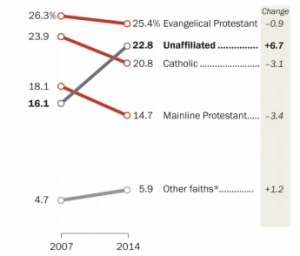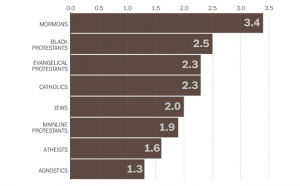The Pew Survey has released its analysis of the 35,000 interviews that it conducted around the United States. It conducted the same survey several years ago. The result show that identification with Christianity is declining rapidly.
Even 35,000 interviews in a nation of over 300,000,000 is not a lot, but Pew is confident of the statistical validity of its findings, within a margin of error.
The big news is the rise of the unaffiliated and the consequent decline of those who self-identify as Christians.
The evangelical group increased in raw numbers, but declined slightly as a portion of the population. The Southern Baptists have experienced a decline in the past ten years, so the evangelicals are found mostly in non-denominational churches (which in my limited experience tend to have Reformed theology and to be generally socially conservative).
The big surprise is the decline of self-identified Catholics, both in numbers and proportion of the population. According to the Pew Survey’s extrapolation, there are three million fewer Catholics today than in 2007. Other surveys have showed Catholic numbers increasing and the proportion of the population (about 25%) staying the same – mostly because of immigration of Hispanics. It is possible that the Pew Survey did not reach Hispanics proportionately; because of their undocumented status and language barriers, many might be hesitant to answer any questions, however innocuous.
As the America article cited in the previous blog pointed out, the connection of many self-identified Catholics is very weak, so the difference between the Pew survey and other surveys may represent the way or context in which the question was asked. In one context, a person who was baptized as a Catholic but hasn’t been to church since then might self-identify as a Catholic, but in another context might not.
The mainline churches have continued their decline. Some sociologists attribute this to the decline of the target population: married couples with children. Despite the claim of liberal churches to be “inclusive,” marginalized people such as single mothers, tend to seek the clear message and help that evangelical churches give.
Catholics have the worst proportion of loses and gains: for everyone who converts to Catholicism, six Catholics leave.
Evangelical groups do far better: for every evangelical who leaves, 1,2 join.
The birthrates differ among the groups:
The gender composition of the churches has no surprises:
Catholic: 46% male; 54% female
Mainline Protestant; 45% male; 55% female
Evangelical Protestant: 45% male; 55% female
Historic Black denominations: 41% male; 59% female
The Pew survey represents self-identification. Other surveys show that in matters of belief and practice, women are far more committed to their churches than men are.
Orthodox Christian: 56% male; 44 % female.
Hindu: 62% male; 38 % female
Among some smaller groups, composed heavily of recent immigrants the greater proportion of males may simply represent the tendency to men to precede women in immigration.
Moslem : 65% male; 35% female
But the high proportion of men in Islam may also represent its special attraction to men.
Unaffiliated: 57% male; 43 % female
- More than a quarter of men (27%) now describe themselves as religiously unaffiliated, up from 20% in 2007. Fewer women are religious “nones,” but the religiously unaffiliated are growing among women at about the same rate as among men. Nearly one-in-five women (19%) now describe themselves as religiously unaffiliated, up from 13% in 2007.
Younger cohorts are less affiliated.
Other surveys have shown that atheists and agnostics are overwhelmingly male.
Thus means the typical churchgoer is an older female; the typical unaffiliated a young male. Whatever is causing the decline in identification with Christianity operates most strongly in the cohort of poor young men, and if they could be reached and converted, other groups also could also be reached and converted.
The Pew survey does try to establish the cause for the increasing tendency not to identify as Christian. Probably merely nominal Christians are putting aside even the name. Their attachment to Christianity has slowly evaporated, and they notice that Christianity is increasingly at odds with modern culture, which has rejected the vision of creation and procreation in Genesis and insists on the right to self-definition, and therefore refuses to conform to any demands outside the autonomous self: non serviam.

